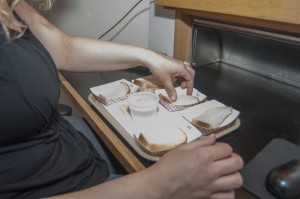Food is science, or at least it is treated as such in the BYU Food Science Sensory Lab.
The Sensory Lab at BYU isn’t well known, but the work done there is used to help companies develop products and provide opportunities for undergraduates to be involved in food science experiments.
Janelle Haws, student manager at the Sensory Lab, said the lab is used to help companies answer questions about their products.

“Companies come in and bring a product that is either in pre-production and they get direction on which way they should go, and how the consumer feels about it and different aspects of it, so aroma, texture and flavor, or they can do a comparison for their product against a competitor,” Haws said. “So they can bring it in and and test whether or not you can taste the difference.”
Haws said BYU provides companies an option to have their food tested for less money than other facilities charge.
“Taste panels are expensive, so they are only going to do it for a product that is pretty close to production,” Haws said. “Comparatively, to professional places, we are less expensive. Our facility is top notch.”
The Sensory Lab has many clients that test products from orange juice to mashed potatoes.
“At the beginning of the semester we had one or two panels a week, but now we probably do five or six a week,” Haws said.
Michelle Lloyd, manager of the Food Science Sensory Lab, said the lab offers its students hands-on experience.
“It gives our students a mentoring opportunity for food science experience,” Lloyd said.
Lloyd explained that the way they entice panelists to participate is through money.
“We pay people to eat food and give their opinions,” Lloyd said.
Marshall Dunn, a food science major from Salem, was a panelist at the Sensory Lab. He said one reason companies use the BYU Sensory Lab is to reduce production costs.
“They are trying to reduce the cost of their current formulation,” Dunn said. “So they are trying to say, ‘If we make this cheaper, can consumers tell?'”
Dunn said his participation on one panel changed his opinion on a particular food.
“I never was a fan of hummus,” Dunn said. “I always avoided it, until they had a hummus panel here and I decided to do it just for the money, and it was so freaking good. That totally changed my outlook on hummus. I have been a hummus fan ever since.”
Dunn remembers his first panel. He said it is a simple process when individuals come in to participate.
“I came in and was given a card number that was assigned to my booth,” Dunn said. “I signed an IRB (Institutional Review Board) certificate agreeing to be a participant in research, and there were some instructions about the panel, and then they slid me a food sample through the booth,” Dunn said.
Dunn explained the process for signing up for a panel after a student has registered on the lab site.
“They send out the mass email, and then it’s first come, first serve,” Dunn said. “If you just did one, then you don’t get to come back for a while.”
Dunn said the reason students don’t get to come back to do a panel for a while is because there are a lot of students in the database that the Sensory Lab can pull from.
“When you do panels, to make the data more statistically significant, you need to break up the panelists as far as age categories go,” Dunn said. “So there are only so many slots available for people in the 18–29 age group.”
Although there are not very many slots available, students can drop in on the day of a panel and see if there have been any cancellations.
Many students in the Food Science Department have been participants because of the classes they were enrolled in.
Breanne Draper, a dietetics major from Springville, said she was a panelist in the Sensory Lab for a class.
“We were testing pineapple juice,” Draper said. “We were given three juices, and we were supposed to find out which one is different. It’s called a triangle test.”
Even though there are limited spots available, some students are really excited about the possibility of becoming panelists, possibly because the lab pays each panelist $3 for every 15-minute panel in which they participate.
Will Sherksnas, an exercise science major from Dorrance, Penn., likes the idea of the Sensory Lab because of the money. He signed up to be a panelist the moment he heard about it.
“Who couldn’t use an extra couple of bucks?” Sherksnas said.




